It’s understandable that the last thing a nurse, physician, pharmacist, or any other healthcare professional wants to worry about is tax deductions.
This daunting thought can also be the reason why so many workers in the healthcare field file too quickly in an effort to complete this task.
Many of the medical professions can be grueling with lots of stress, little sleep, and long hours.
I understand because I’ve been a Pharmacist for almost 20 years.
To add to your already long list, you will want to make sure all your documents are in line for taxes in order to stay ahead of the game.
In this article, I will show you how to get the most deductions in order to lower your tax bill.
THIS POST MAY CONTAIN AFFILIATE LINKS. PLEASE READ MY DISCLOSURE FOR MORE INFO. This means if you click on any of the links, I’ll receive a small commission.
Key Takeaways
- Tax home: Establishing a tax home is crucial for travel nurses to maximize deductions.
- Self-employed health insurance: Contract nurses can benefit from the self-employed health insurance deduction.
- Travel stipends: Travel stipends for nurses can be tax-deductible if certain conditions are met.
- Duplicate living expenses: Maintaining duplicate living expenses is necessary to qualify for certain travel deductions.
- IRS audit: Travel nurses should be cautious of IRS audits when claiming deductions.
Keep reading to get the full list of items you can deduct this year!
Getting Ready for Tax Season 2025
When preparing for the tax season, please keep in mind that you can write off expenses that are common for your profession and ones that are necessary to help you complete your job requirements.
If you need to claim expenses as an employee, then be sure to fill out the itemized deduction Schedule A Form.
However, if you are an employee receiving a W-2, certain employee expenses may no longer be deductible after the Tax Cuts and Jobs Act of 2017. You can get the full guide here.
I’ve put together a quick, generalized tax deductions checklist for healthcare professionals for you to download below.
According to the IRS, nurses who are employees can no longer deduct unreimbursed employee expenses on their federal taxes starting in 2018 due to the Tax Cuts and Jobs Act.
Nurses who are independent contractors can continue deducting these expenses from their federal taxes. Just be sure to double check with your state regulations.
UPDATE: Many provisions in the Tax Cuts and Jobs Act like the increased standard deduction amounts expire in 2025, meaning deductions could change again in the future. Nurses should stay up-to-date on evolving tax laws impacting their profession.
What is a Tax Deduction?
A tax deduction is money that you subtract from your earned income, which will lower the amount of money you are taxed and the amount of tax you may possibly owe.
If you want more handy tax tips, then feel free to check out my latest articles here. You can sign up to get on the waiting list if you’d like to file with me this year.
5 Common Itemized Tax Deductions for Nurses, Mid-wives, and other Healthcare Professional
Now that you know what’s new for this year, let’s go over a few of the most common tax deductions for your industry. Especially if you work independently.
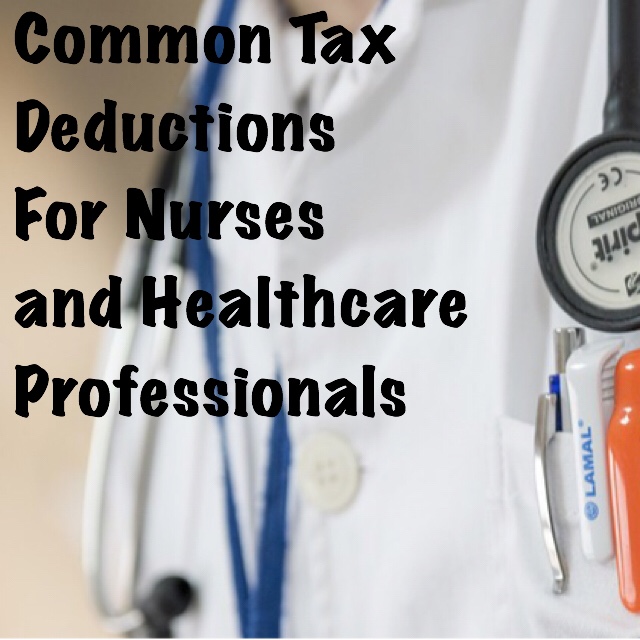
1. Clothing/Uniforms
Your work outfit has to be specific to the work you do as a Healthcare Professional, Pharmacist, or Nurse.
For example, scrubs, lab coats, or medical shoes are items you can write off when doing your taxes.
If you’re thinking about something more in the fashion sense, you’d have to be able to prove its necessity for accomplishing your job.
2. Supplies
Any amount you spend on materials you purchase as a Healthcare Professional or Nurse for your contract work or job.

These items include:
- Medical equipment
- Protective gear
- Shoes
- Sanitizing supplies
- Medical equipment, etc.
Power Tip: Keep a good record of each item you buy, just in case you need it in the future for the IRS.
3. Licenses and Education
Being licensed is a common requirement for professionals in the healthcare industry.
The good thing for you is that you can write off the fee associated with getting your license and maintaining your license.
You can also write off fees for your local business license if you have one.

When it comes to your education, which is highly important to stay competitive, these fees can also be written off.
Along with any travel associated with obtaining your continued education, such as healthcare-related conferences, meetings, and seminars.
Once licensed, you can deduct the cost of any continuing education classes needed to improve your skills.
If you completed your RN–BSN degree last year or any other schooling, you may be eligible for a tax deduction or credit.
Tuition for school has to be done separately from the 1098-T form that you will receive from your school.
Subscriptions to magazines, medical journals, or books related to your job also count as deductions since you need them to stay up-to-date with the latest trends.
Are You a Travel Nurse?
If so, you may qualify for quite a few travel tax deductions. This may include mileage, transportation, parking costs, and tolls just to name a few.
For travel nurses (or other traveling healthcare professionals), establishing a tax home is essential to maximize tax deductions. A tax home is generally the city or area where your main place of business is located.
If you work outside your tax home, you can deduct travel expenses such as lodging, meals, and transportation.
To qualify, you must maintain a residence in your tax home and incur duplicate living expenses.
Understanding and documenting your tax home status can prevent unnecessary taxation on travel stipends.
4. Any Services
Services such as dry cleaning, tax preparation fees, or having uniforms altered are examples of services needed to maintain the integrity of your job.
5. Self-Employed Health Insurance Deduction
Contract nurses who are self-employed may qualify for the self-employed health insurance deduction.
This allows you to deduct premiums paid for medical, dental, and long-term care insurance for yourself, your spouse, and dependents.
To be eligible, you must not have access to employer-sponsored health insurance. This deduction can significantly reduce your taxable income, providing substantial savings.
Keep track of your nursing expenses through a bookkeeping software such as FreshBooks!
Other Tax Deductions for Nurses, Pharmacists, and Healthcare Professionals
Now that you have the most important deductions to consider, I want to go a bit more in-depth with other expenses you need to keep track of throughout the year.

Home Office Tools
- Office Phone
- Answering Service
- Cell Phone
- Internet Service
Supplies and Expenses
- Bag – Medical
- Computer and Printer
- Business Cards and Briefcase
- Business Meals
- Medical Equipment
- Office Supplies
- Digital Recorder
- Referral Service Repairs – Equipment
- Stationery
Professional and Continuing Education
- Licenses
- Memberships
- Insurance
- Seminars
- Publications
- Correspondence Course
- Fees Lab Fees
- Materials & Supplies
- Photocopy Expenses
- Reference Material
- Registration Fees
- Transcripts
- Tuition
- Textbooks
- Malpractice & Liability Insurance
- Journals – Medical
- Legal fees
Vehicle and Travel
- Car Rental
- Parking & Tolls
- Total Miles Driven
- Business Miles Driven
- Airfare
- Taxi, Bus
- Lodging
- Meals
Miscellaneous
Uniforms & Upkeep
- Alterations
- Shoes
- Cleaning
- Hat, Cap Jacket, Pants, and Scrubs
- Laundry & Cleaning
Professional Fees & Dues
- Alumni Dues
- Medical Association Dues
- Professional Association Dues
- Union Dues
Forms Needed to Claim Deductions as a Pharmacist, Nurse, or other Healthcare Professional
Travel nurses and other traveling professionals are generally independent contractors, meaning self-employed.
Whatever way you are paid, you’ll want to keep track of every amount of money you receive.

IRS Form 1040 is needed to write off your expenses as a Nurse, Pharmacist, or Healthcare Professional. The expenses of your business will be placed inside the deductions area of Form 1040.
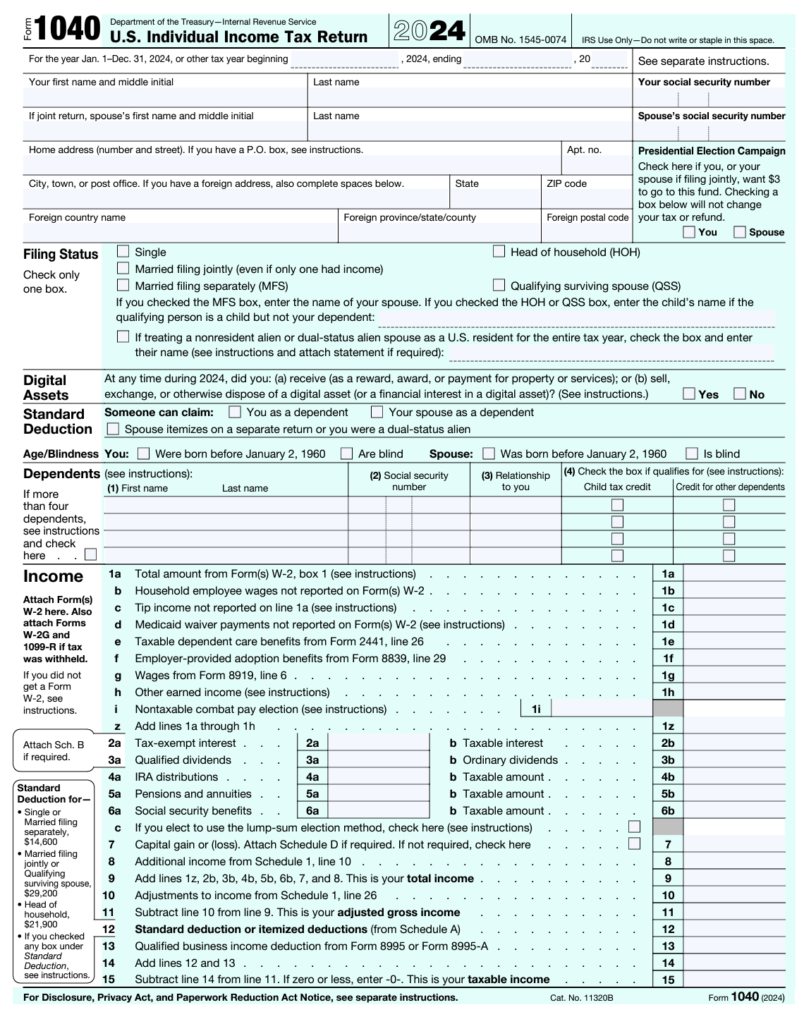
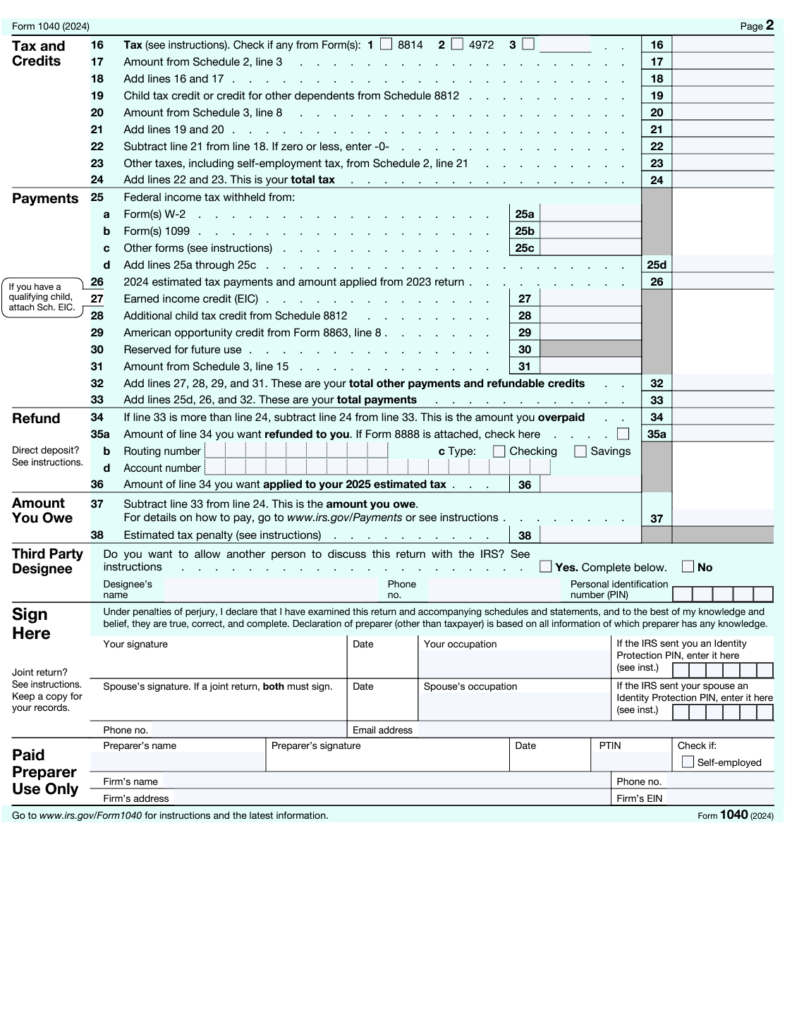
As an independent contractor, you’re accountable for all of your tax payments plus your travel expenses.
Remember that deductions reduce your tax payments as mentioned before. There are also traveling nurses who work as full-time W-2 employees for nursing staffing agencies.
Power Tip: Use the standard deduction only if your total expenses do not exceed the dollar amount set by the IRS.
An itemized deduction is only needed if your expenses are more than the set standard deduction dollar amount.
You can use the IRS Form 1040 Schedule C if you need to itemize your deductions.
How can you tell if you’re self-employed/independent contractor or employee?
It depends on the tax form the employer gives you: W-2 = employee and 1099-MISC = self-employed/independent contractor.
Remember: Keep track of your expenses and income on a spreadsheet or bookkeeping program such as FreshBooks.
The Tax Cuts and Jobs Act nearly doubled the standard deduction amounts, which means fewer taxpayers now itemize deductions.
For tax year 2025, the standard deduction amounts are as follows:
| 2025 Standard Deduction and Personal Exemption (Estimate) | |
| Filing Status | Deduction Amount |
| Single | $15,000.00 |
| Married Filing Jointly | $30,000.00 |
| Head of Household | $22,500.00 |
| Married Filing Separately | $15,000.00 |
| Personal Exemption | Eliminated |
Your should ALWAYS calculate whether the standard or itemized deductions result in a larger reduction in taxable income for you!
Those who lost miscellaneous deductions may now be better off taking the higher standard deduction.
How to Keep Your Files Tax Information Organized
- Hold on to your W-2 forms and 1099 forms
- Save receipts of items you bought for your business if you’re a contractor
- Keep track of expenses in an Excel spreadsheet or through a bookkeeping software such as FreshBooks
- Have a tax preparation checklist completed
- Keep a detailed Nurse, Pharmacist, or Healthcare Professional tax deduction checklist handy
Get your biggest tax refund guaranteed with TurboTax. The #1 best selling tax software. Start today.
My Final Thoughts
I hope this tax deduction checklist helps you navigate through the tumultuous waters of the income tax season.
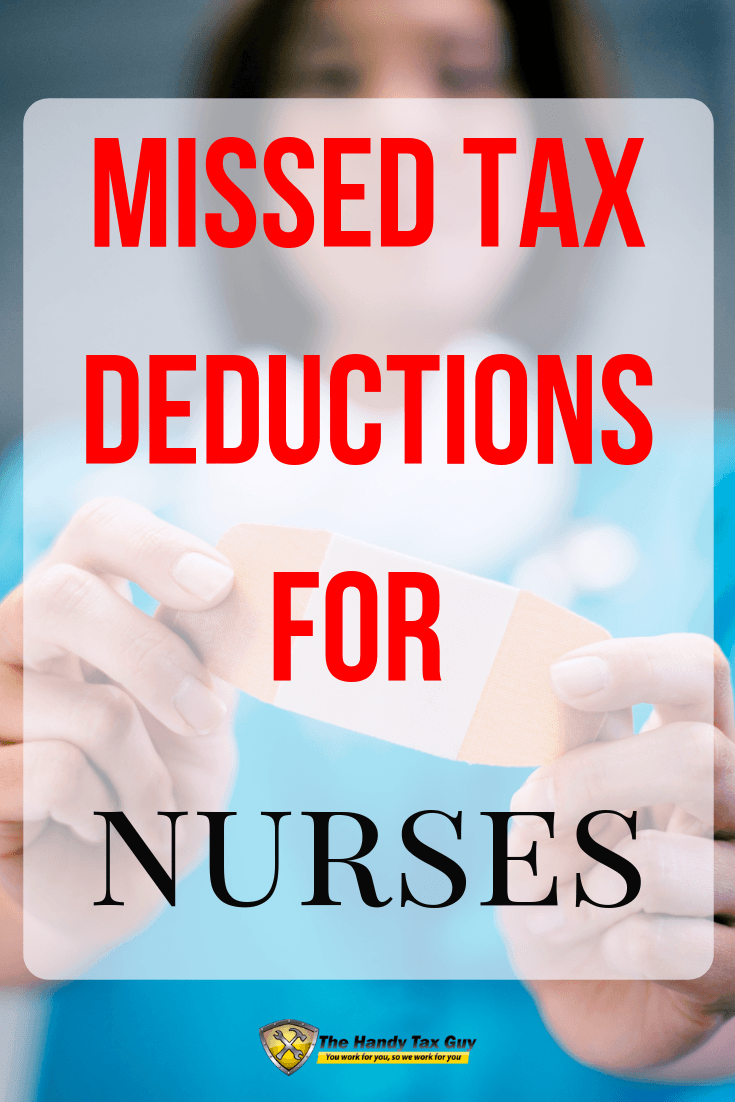
Let me know which deduction surprised you the most in the comment section below! For more money-saving tips and guides, subscribe to the weekly newsletter!
If you enjoyed this article, then you’ll love these:
- Best Rules for Claiming a Dependent on Your Tax Return
- Do I Need to File a Tax Return?
- How to Choose the Best Filing Status
- 7 Creative Ways to Make Money from Home for Busy Professional Moms
Get started on your taxes early TODAY!
Until the next money adventure, take care!

Disclosure Statement: All data and information provided on this site is for informational purposes only. The Handy Tax Guy makes no absolute representation of the correctness, mistakes, omissions, delays, appropriateness, or legitimacy of any information on this site.
**Note: Each client circumstance will vary on a case-by-case basis**
(Original Article Published in 2016/Updated On: January 14, 2025)


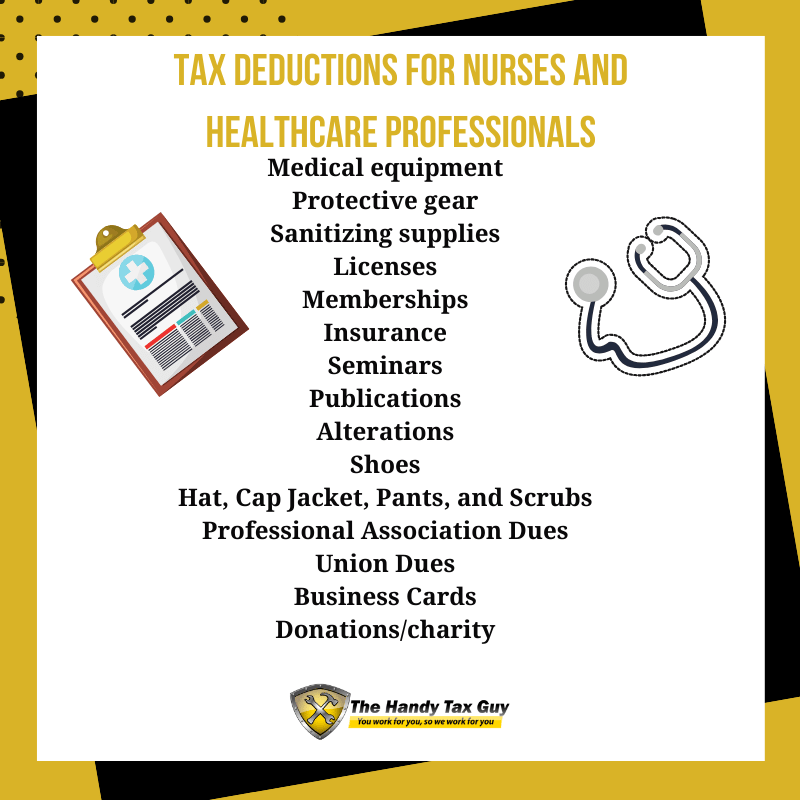

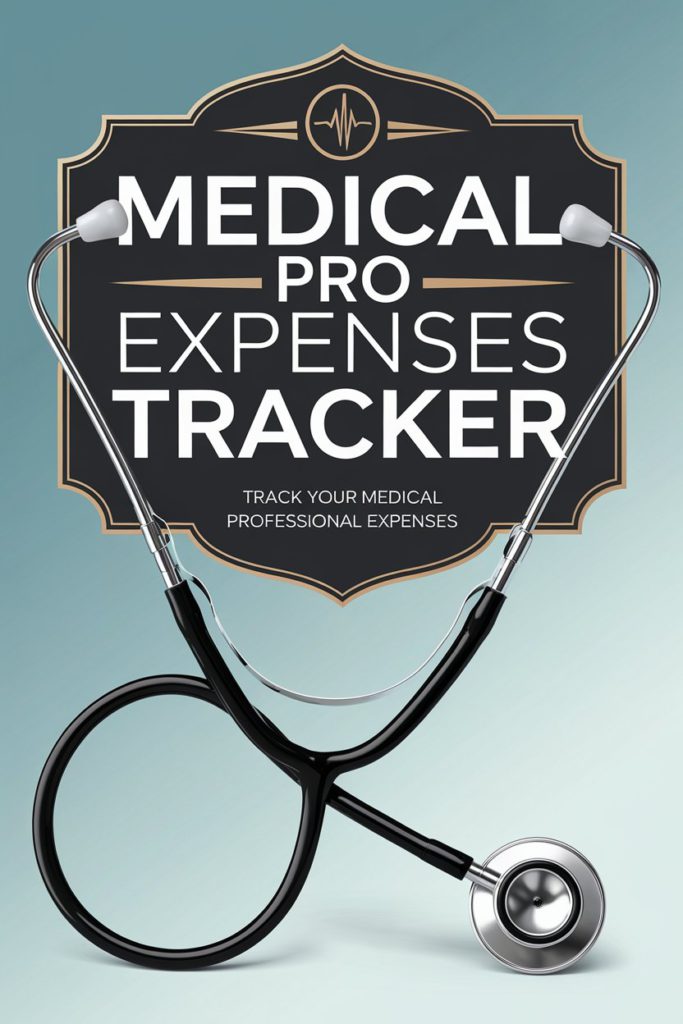



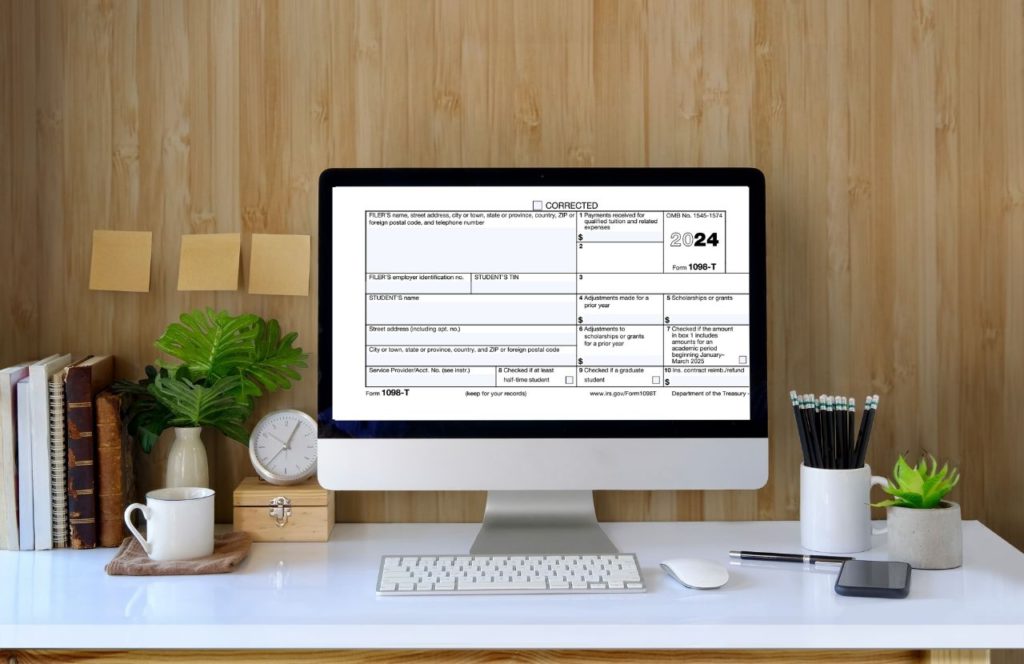

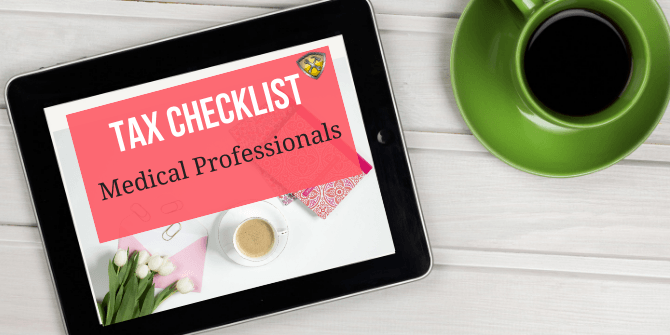

I thought these deductions went away with the new tax codes. Where in our taxes do we deduct these?
Hi Jennifer!
You use these tax deductions if you plan on itemizing on your tax return. If not, you’ll use the standard deduction. You can read more about the difference between the two here: https://www.handytaxguy.com/tax-exemption-vs-tax-deduction-whats-the-difference/ And don’t forget to chat with your Tax Advisor or Accountant for more information that specific to your needs.